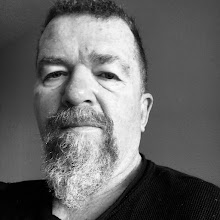Cormac McCarthy's Perfect Day
So you think that you're just a pretend writer, with your freshly oiled typewriter, kerthunking away in the kitchen or wherever you prefer, with your stack of blank paper, fresh ribbon and correction tape, with dictionary for spell checking? So you think that “real” writers, the ones of acclaim and notoriety, the ones actually being published and payed, only use computers; that the image of a smoke-filled room and manual typewriter is only for the movies or those select few of the Typewriter Brigades, the Typosphere? Well think again.
True, most writers do use computers of one sort or another for at least one stage of the writing process, whether it be for collecting research data, composing the first draft, or throughout the entire process. But there are the occasional writers who, having developed a now-arcane writing process with which they are comfortable, stick to it over the years and decades, regardless of changes in media technology swirling about them.
One example I happened upon this week is Cormac McCarthy, the acclaimed writer, whose recent novel “The Road” is being made into a feature film, to soon be released. In this interview, on the Wall Street Journal's website, McCarthy alludes indirectly to his craft of writing being typewriter-based, without actually coming out and directly saying so. As with most true writers, his process is simultaneously an extremely personal choice and also something not easily talked about. McCarthy is a private person, and doesn't like to be asked at book signings (which he rarely attends anyway) about his writing methods.
But there are these clues in the WSJ interview, like here, where he admits “Instead, I get up and have a cup of coffee and wander around and read a little bit, sit down and type a few words and look out the window.”
Hmm, he types a few words at a time, slowly, thoughtfully, introspective. This sounds like the pace of a typewriter man; not the kind of writer incessantly demanded upon by the necessities of the laptop's battery life, spelling and grammar checker, and screen saver; or spoiled by the distractions of the Internet.
There's another clue, further down in the interview: “My perfect day is sitting in a room with some blank paper.” There; that's it: the final proof. Here, he's being asked by the interviewer, John Jurgensen, what the affects of aging have upon his writing process, and what are the most important things left in life. There's being with his son, John; and this sitting in a room with some blank paper. "That's heaven. That's gold and anything else is just a waste of time.”
Just two simple quotes, two subtle clues. I'll leave it up to you to decipher for yourselves whether Cormac McCarthy indeed uses a typewriter (there is the inevitable Google search to lead you further). But as for him, he's found his little bit of heaven in the craft of his writing. How about you; have you found your little bit of heaven in your writing?

1 Comments:
Ah, The Road. What a book. I think I say this about once a week.
Strangely enough, my LBOH is using writing to connect and converse with other people I would not otherwise have met. That isn't something one could say about writing prior to the internet, if one was not famous. And so in that way, I appreciate the digital age.
Post a Comment
<< Home